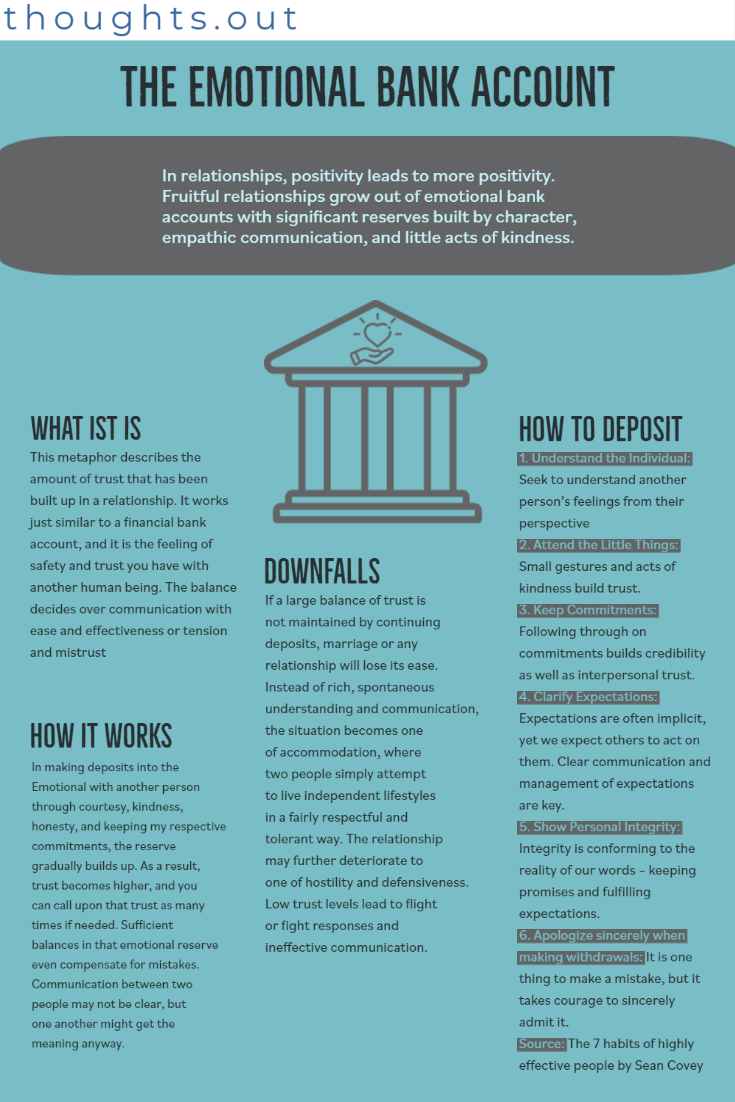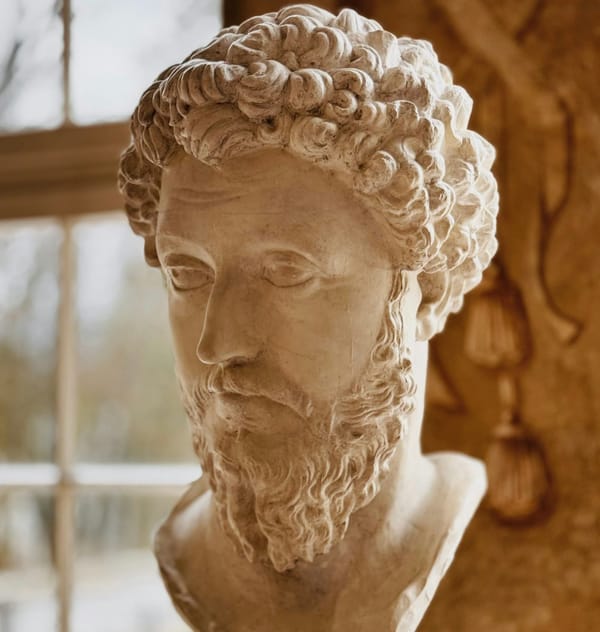The emotional bank account
The emotional bank account describes the amount of trust that has been built up in a relationship. It works just similar to a financial bank account, and it is the feeling of safety and trust you have with another human being.

After quitting my job as a working student to focus on my bachelor’s thesis, I noticed a fundamental shift in perspectives on my financials. My generosity certainly took a big hit as my belt had to be tightened. With no additional income streams, even little expenses increasingly mattered. I remember putting 200€ on a furious bet on some vanities with my girlfriend. I lost that bet, but I did not care. Now, I wish I could still say so – my relationship with money changed drastically as I saw my reserve threatened by continuous withdrawals having no additional streams of income anymore.
Reading Sean Covey’s “the seven habits of highly effective people”, I was introduced to the concept of an emotional bank account. This metaphor describes the amount of trust that has been built up in a relationship. It works just similar to a financial bank account, and it is the feeling of safety and trust you have with another human being.
The account’s balance decides over communication with ease and effectiveness or walking over minefields – Just as remaining calm and generous knowing there is financial reserve and turning frugal when there is not.

The foundation of trust in relationships
In making deposits into the Emotional with another person through courtesy, kindness, honesty, and keeping my respective commitments, the reserve gradually builds up. As a result, trust becomes higher, and you can call upon that trust as many times if needed. Sufficient balances in that emotional reserve even compensate for mistakes. Communication between two people may not be clear, but one another might get the meaning anyway. Friends, Partners, or Family Members are not made “an offender for a word” if we share a high emotional bank account with them. When the level of trust is high, communication is easy, instant, and effective.
On the other side, if we have a habit of showing discourtesy, disrespect, cutting the other off, overreacting, ignoring the other, becoming arbitrary, betraying their trust, threatening, or playing little tin god in their life, eventually our emotional bank account is overdrawn. When trust levels decline flexibility goes with them. Things get easily emotional.
If a large balance of trust is not maintained by continuing deposits, marriage or any relationship will lose its ease. Instead of rich, spontaneous understanding and communication, the situation becomes one of accommodation, where two people simply attempt to live independent lifestyles in a fairly respectful and tolerant way. The relationship may further deteriorate to one of hostility and defensiveness.
The flight or fight response not only creates verbal battles, slammed doors, refusal to talk, emotional withdrawal, and self-pity, it deprives effective communication of its very basis. Low trust levels cause communication processes to close, turning mechanical and deeply unsatisfying. In this atmosphere, cooperation or counsel will certainly not be possible as people shut down to your advice.
Back when my brother and I were kids, we used to fight a lot. As we could not have been more different in our interests and character there was a lot of friction between us. Pleasantries and fights appeared frequently on the agenda. Consequently, cooperation became simply non-existent. Being as non-reflective as a 9-year-old could be, I viewed my brother as someone who would just not share his toys or was fun to play with and harmonious experiences were rather exceptional.
The rare times we played together were quite fun, but because my bank account was so overdrawn, he would often end up refusing all sorts of cooperation from a short-range emotional perspective.
What I would have needed was a positive balance to communicate with him in these matters. Then maybe his behaviour might have been different and more open just as my financial paradigm reversely shifted after quitting the job simply because of the reserve in the bank account.
If I had chosen to be kinder to him instead of turning annoyedly away and thus started making deposits to the relationship he might not have responded at first. He might have even been suspicious. But with additional continuing deposits the overdrawn balance would have shrunken - eventually leading up to better mutual understanding and fun with each other.
There is no quick fix in a relationship. Building and repairing take time. Trust is built by long-term investments and fruitful cooperation only really works with a positive balance on the emotional bank account.
How can we make deposits?
Six major deposits build up the Emotional Bank Account.
-
Understanding the Individual
Seeking to understand another person's feelings is probably one of the most important deposits you can make and the very basis for every other deposit. You simply don’t know what constitutes a deposit to another person until you understand that individual. There is our tendency to project out of our autobiographies and read into other people's desires, needs and feelings. One person's mission is another person’s minutiae. What might be a deposit for you might not be perceived by someone else as a deposit if the person’s deep interests or needs are not touched.
Understand others as an individual, the way you would want to be understood, and then treat them in terms of that understanding. Just as parenting advice goes: “Treat them all the same by treating them differently”. -
Attending the Little Things
In relationships, the little things are the big things. Doing the little things is how we express our value and respect for others. Small gestures, a little kindness, doing something you didn’t “have” to: These are the things that build trust. -
Keeping Commitments
Keeping a commitment or promise is a major deposit. Reversely it is a major withdrawal; people get hurt and the next time promise is made, it appears implausible. Following through on commitments builds credibility as well as interpersonal trust and builds up the emotional reserve. -
Clarifying Expectations
As we often read our biography into other people's lives, we expect others to know what we expect of them. Here, expectations are implicit, yet we expect others to act on them. If there is unclarity around our expectations in terms of roles and goals in a relationship, we will face difficulties. Clear communication and management of expectations are key.
The deposit is to make the expectations clear and explicit in the beginning. This investment of effort will prevent misunderstandings to compound, turning into personality clashes and communication breakdowns. Communicate and mutually agree on expectations. -
Showing Personal Integrity
Integrity provides the soil for growing trust accounts and fruitful relationships. This goes beyond honesty. Integrity is conforming to the reality of our words – keeping promises and fulfilling expectations. One way of manifesting integrity is to be loyal to those who are not present. In doing so, we build the trust of those who are present.
Sweet-talk to the face and bad-mouth behind someone's back are the essence of duplicity. Sometimes this might appear as depositing to the person you’re with, but it is a withdrawal because you communicate your lack of integrity. Treating everybody with the same set of principles will earn you respect and trust. And to be trusted, it is said is greater to be loved. -
Apologizing Sincerely when making withdrawals
We are human as we make mistakes. This is part of life. But when you notice a violation of trust on your side, a sincere apology can counteract the damage we have done.
Great deposits come in sincere words – "I was wrong", "I showed you no respect", or "I'm sorry". It takes a great deal of character strength to apologise. A person must have a deep sense of security to genuinely apologise. It is one thing to make a mistake, but it takes courage to sincerely admit it.
In relationships, positivity leads to more positivity. It is not about keeping score. It's about investing in relationships with our loved ones and the shared emotional bank account with them. Fruitful relationships grow out of bank accounts with significant emotional reserves built by character, empathic communication, and little acts of kindness.




